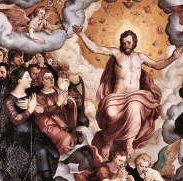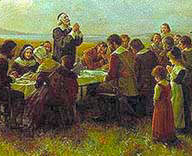On the first attempt with CanCord, it back fired that the inner memory was full, and could not record. Hope to lerarn more.
D.
All Saints (C) – Homily of Fr. Aelred.
Intro
Today is the
Solemnity of All Saints, when we
celebrate the canonised saints and those saints known to God alone.
Homily In the saints the Church presents the
heroes and heroines of Christianity as models and intercessors. Although the
saints had their personal failings, they still provide us with admirable
examples at divine power at work in human beings. Alban Butler wrote in the 18th
century: “The lives of the saints furnish the Christian with a daily spiritual
entertainment, which is not less agreeable than affecting and instructive”. And
speaking of the saints Vatican II said, “ To look on the lives of those who
have faithfully followed Christ is to be inspired with a new reason for seeking
the city which is to come … God shows us in a vivid way his presence and his
presence and his face in the lives of those companions of ours who are more
perfectly transformed into the image of Christ”.
Like St. Paul the saints can say, “I live, not now I, but
Christ lives in me”” Therefore honour given to the saints is given to Christ.
The 1st
Reading from the Book of the Apocalypse shows us in heavenly symbolic
fashion the saints around the throne in heaven. These have the seal of the
living God on their foreheads. This divine signet ring is like of an orients
monarch which marked and sealed as his
property. The sealing of God’s servants does not symbolize protection from
tribulation and death but means being sustained in and through
tribulation. These martyrs have won
their victory by suffering death, like Christ himself, not by inflicting hurt.
A glorious destiny awaits the saints, and us too, but precisely as faithful
followers of the suffering Christ. “Was it not necessary that Christ should
suffer and so enter into his glory.” This is the divine pattern.
According to St. Paul the more excellent way of following
Christ is through the exercise of agape, love. It is the highest of the divine
gifts, and its acquisition was the foremost aim of all the saints. St. John of
the Cross said, “At the evening of life, we shall be judged by our love”. And
another great Catholic sage, Jaque Maritain, said, “In the evening of life
there is no greater than to have loved Jesus Christ”.
Prayer Lord God, grant us, with all the saints,
the peace and joy of heaven. We ask this thro’ Christ our Lord.
The Monastic Night Office Second Reading, Anastasius of Sinai (PC 89, 1192-1193)




 During November, as in all of Ordinary Time (Time After Pentecost), the Liturgy signifies and expresses the regenerated life from the coming of the Holy Spirit, which is to be spent on the model of Christ's Life and under the direction of His Spirit. As we come to the end of the Church year we are asked to consider the end times, our own as well as the world's. The culmination of the liturgical year is the Feast of Christ the King. "This feast asserts the supreme authority of Christ over human beings and their institutions.... Beyond it we see Advent dawning with its perspecitive of the Lord's coming in glory."— The Liturgy and Time, A.G. Mortimort
During November, as in all of Ordinary Time (Time After Pentecost), the Liturgy signifies and expresses the regenerated life from the coming of the Holy Spirit, which is to be spent on the model of Christ's Life and under the direction of His Spirit. As we come to the end of the Church year we are asked to consider the end times, our own as well as the world's. The culmination of the liturgical year is the Feast of Christ the King. "This feast asserts the supreme authority of Christ over human beings and their institutions.... Beyond it we see Advent dawning with its perspecitive of the Lord's coming in glory."— The Liturgy and Time, A.G. Mortimort The national holiday (USA) of Thanksgiving also falls on the last Thursday of November. There is a special liturgy which may be used on this day. (Read more
The national holiday (USA) of Thanksgiving also falls on the last Thursday of November. There is a special liturgy which may be used on this day. (Read more 







